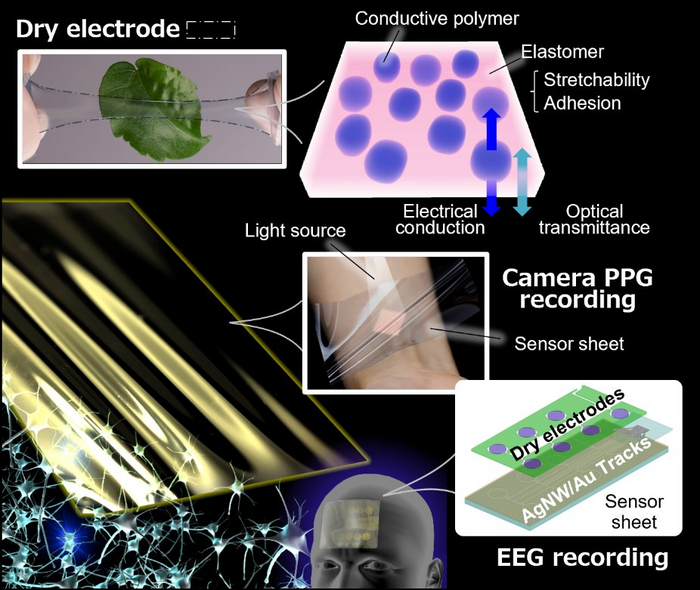Researchers at Osaka University in Japan engineered a wearable electroencephalography (EEG) device that can measure brain activity, potentially letting clinicians monitor conditions such as depression or dementia. At present, assessing brain activity requires a trip to a facility with bulky and expensive equipment, making long-term monitoring difficult. This latest technology aims to allow for at-home measurements of brain activity.
The device consists of a near-transparent patch that is flexible and stretchy. The adhesive patch can be worn on the forehead and provides brain activity readings that are comparable in accuracy to those obtained using larger and more expensive equipment.
Current measurement of brain activity can cast light on a variety of conditions, but it typically requires a visit to a medical facility where a range of bulky and expensive equipment is available. However, assessing neural activity during daily life may be more meaningful. Such measurements could provide a window into long-term trends and changes in brain activity during different tasks, rather than a mere snapshot in time.
Wearable EEGs have been developed previously, and include electrodes that contact the scalp, but these bulky headsets are not convenient for long-term use and can cause pain and discomfort if worn for a long time. They can also suffer from a poor signal-to-noise ratio, making it difficult to obtain useful readings.
To address this, these researchers have created a wearable EEG that is somewhat more discreet and they report that it provides more sensitive measurements than existing wearable systems. The wearable patch consists of a stretchable organic elastomer and a conductive polymer and is largely transparent, making it difficult to spot when in place on the forehead.
“We were able to fuse together organic and inorganic materials to create a stretchable and transparent sensor sheet that can be worn on the forehead, is gentle to the skin, and is invisible to the eye,” said Teppei Araki, a researcher involved in the study. “Unlike conventional wearable devices, our multifunctional electrode system has medical device-like performance, is easy to apply, and is comfortable to wear for long periods of time.”
The Japanese researchers point to the fact that they were able to perform sleep-stage classification using the wearable EEG devices as evidence of their superior performance, as such classification typically requires very clear EEG readings. The researchers also hope to be able to adapt the technology to assist in monitoring an array of disease states.
“One other key advantage of our sensor sheet is its range of possible applications,” said Tsuyoshi Sekitani, another researcher involved in the study. “It can potentially be used to remotely assess many other health indicators, such as electrocardiograms, pulse waves, blood oxygen saturation, or blood flow.”
Study in journal Advanced Materials Technologies: Skin-Like Transparent Sensor Sheet for Remote Healthcare Using Electroencephalography and Photoplethysmography
